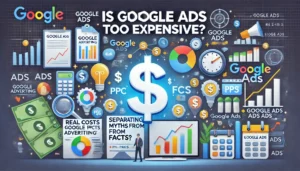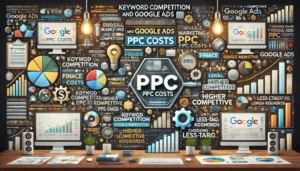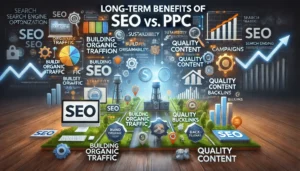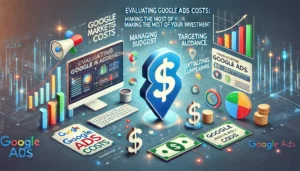Is Google Ads Too Expensive? Unveiling the Truth Behind PPC Costs

Is Google Ads Too Expensive? Many business owners and marketing managers wonder if Google Ads is too expensive. This article will explore the real costs behind pay-per-click (PPC) advertising on Google. We’ll separate the myths from the facts and help you understand whether Google Ads is a smart investment for your business.
Key Takeaways
- Google Ads costs can vary widely but are often customisable to fit different budgets.
- Common misconceptions about Google Ads pricing can deter businesses from exploring its potential.
- Factors like keyword competition, quality score, and targeting options significantly impact costs.
- There are strategies to lower your cost-per-click and optimise your ad budget effectively.
- Evaluating your business needs and goals is crucial in determining if Google Ads is the right choice for you.
The Perception vs. Reality of Google Ads Costs
Common Misconceptions About Google Ads Pricing
Many people think Google Ads is too expensive for small businesses. They believe only big companies can afford it. This isn’t true. Google Ads can fit any budget. You can set daily limits and control your spending. Some think you need to spend thousands to see results. But even a small budget can bring good returns if used wisely.
Real-World Examples of Google Ads Budgets
Let’s look at some real numbers. A local bakery might spend £10 a day on ads. This brings in 50 clicks, costing about £0.20 per click. A larger company might spend £500 a day, getting thousands of clicks. The cost per click can vary, but both businesses see benefits. Here’s a simple table to show this:
| Business Type | Daily Budget | Clicks per Day | Cost per Click |
|---|---|---|---|
| Local Bakery | £10 | 50 | £0.20 |
| Large Company | £500 | 2500 | £0.20 |
How to Assess If Google Ads Is Worth the Investment
To know if Google Ads is worth it, think about your goals. Do you want more website visits? More sales? Set clear goals and track your results. Use tools like Google Analytics to see how your ads perform. If you spend £100 and make £200 in sales, your ads are working. Always measure your return on investment (ROI). This helps you decide if you should spend more or adjust your strategy.
Google Ads can be a powerful tool for any business, big or small. The key is to manage your budget and track your results carefully.
Factors Influencing Google Ads Cost
Keyword Competition and Its Impact on Cost
The level of competition for specific keywords plays a huge role in determining your Google ads PPC costs. Highly competitive keywords, especially in industries like finance or legal, often have higher costs per click (CPC). This is because many businesses are vying for the same limited ad space. Choosing less competitive, long-tail keywords can help lower your costs.
The Role of Quality Score in Pricing
Google assigns a Quality Score to your ads based on their relevance, click-through rate (CTR), and landing page experience. A higher Quality Score can lead to lower costs and better ad placements. To improve your Quality Score, ensure your ads are highly relevant to the keywords and provide a good user experience on your landing page.
Geographical and Demographic Targeting
Where and to whom you show your ads also affects the cost. Ads targeted at densely populated urban areas or high-value demographics tend to be more expensive. However, by using precise targeting options, you can ensure your ads reach the most relevant audience, potentially increasing your return on investment (ROI).
Understanding these factors can help you manage your Google ads PPC budget more effectively. Partnering with a PPC agency can provide expert insights and strategies tailored to your business needs.
Optimising Your Google Ads Budget
Setting a Realistic Budget for Your Campaign
Understanding how to optimise your budget is crucial to maximising the return on your investment (ROI) with Google Ads. Start by setting a realistic budget that aligns with your business goals. Prioritise your campaigns by allocating more funds to high-performing ads. This ensures that your top sellers or high-value services get the attention they deserve.
Strategies to Lower Your Cost-Per-Click
Reducing your cost-per-click (CPC) can significantly impact your overall budget. Conduct thorough keyword research to identify relevant, high-volume keywords with lower competition. Tools like Google Keyword Planner can be invaluable for this. Additionally, focus on improving your Quality Score by creating compelling, relevant ads that lead to high-quality landing pages.
Utilising Negative Keywords Effectively
Negative keywords are essential for preventing your ads from showing up in irrelevant searches. This not only saves money but also improves the quality of your traffic. Regularly perform a Google ads audit to identify and add negative keywords to your campaigns. This is a crucial step in any PPC management strategy.
A well-optimised Google Ads campaign can turn curious browsers into loyal customers. By focusing on the right strategies, you can make the most of your budget and achieve your business goals.
By following these expert tips, you can ensure that your Google Adwords PPC campaigns are both effective and efficient. Whether you’re working with a London PPC agency or managing your own PPC eCommerce agency, these strategies will help you get the best results.
Is Google Ads Right for You?
Before diving into Google Ads, it’s crucial to assess your business goals. Are you looking to increase website traffic, generate leads, or boost sales? Understanding your objectives will help you determine if Google Ads aligns with your needs. If your goals are clear and measurable, Google Ads can be a powerful tool to achieve them.
Google Ads isn’t the only option out there. You might also consider social media advertising, SEO, or other PPC platforms. Each has its own strengths and weaknesses. For instance, while Google Ads offers a broad reach, social media ads can be more targeted based on user behaviour and interests. Weigh the pros and cons to see which platform best suits your business.
Many businesses have found success with Google Ads. For example, a local bakery increased its online orders by 50% within three months of starting a Google Ads campaign. Another case is a tech startup that saw a 200% return on investment (ROI) after six months. These examples show that with the right strategy, Google Ads can deliver impressive results.
Google Ads can be a game-changer for your business, but it’s essential to evaluate if it aligns with your goals and needs. Consider other platforms and learn from successful case studies to make an informed decision.
Alternatives to Google Ads
Social media platforms offer a variety of advertising opportunities that can be more cost-effective than Google Ads. Facebook Ads, for instance, allow you to target specific demographics and interests, often at a lower cost-per-click. Instagram, LinkedIn, and Twitter also provide robust advertising tools that can help you reach your audience effectively.
Investing in Search Engine Optimisation (SEO) can yield long-term benefits that pay-per-click (PPC) campaigns might not offer. While PPC provides immediate visibility, SEO helps you build organic traffic over time. This can be more sustainable and cost-effective in the long run. By focusing on quality content and backlinks, you can improve your search engine rankings without the ongoing costs associated with PPC.
If Google Ads feels too expensive, you might want to explore other PPC platforms like Bing Ads or Amazon Ads. These platforms often have lower competition and can offer a better return on investment. Additionally, they can be particularly effective if your target audience uses these platforms frequently.
Sometimes, diversifying your advertising strategy can yield better results than sticking to a single platform. Consider your business goals and audience when choosing the right advertising channels.
The Value Beyond Cost
Is Google Ads Too Expensive? When evaluating Google Ads, it’s crucial to look beyond the initial costs and focus on the return on investment (ROI). ROI is a key metric that helps you understand the value generated from your ad spend. By tracking conversions, sales, and other key performance indicators (KPIs), you can determine if your campaigns are profitable. Use tools like Google Analytics to measure these metrics effectively.
Consistent advertising with Google Ads can yield long-term benefits for your business. Over time, you build brand recognition and trust among your target audience. This ongoing presence can lead to increased customer loyalty and higher lifetime value. Additionally, continuous advertising helps you stay competitive in your market, ensuring that your brand remains top-of-mind for potential customers.
Pay-per-click (PPC) advertising is not just about immediate sales; it’s also a powerful tool for building brand awareness. By appearing in search results and on various websites, your brand gains visibility. This increased exposure can lead to more organic traffic and a stronger online presence. Effective PPC campaigns can help you reach a broader audience, making your brand more recognisable and trusted over time.
Investing in Google Ads is not just about the cost; it’s about the value it brings to your business in terms of growth, visibility, and long-term success.
Conclusion
Is Google Ads too expensive in conclusion, while Google Ads might seem expensive at first glance, it’s essential to understand the factors that influence its costs. By carefully managing your budget, targeting the right audience, and optimising your campaigns, you can make the most out of your investment. Remember, the value of Google Ads goes beyond just the cost per click; it’s about reaching potential customers and driving growth for your business. So, take the time to plan and adjust your strategy, and you’ll find that Google Ads can be a powerful tool for achieving your marketing goals.
Frequently Asked Questions
Is Google Ads really expensive?
Google Ads can seem costly, but it really depends on how you manage your budget and campaigns. With the right strategy, you can control costs and get a good return on your investment.
How do I know if Google Ads is worth the money?
To determine if Google Ads is worth it, look at your business goals and measure the return on investment (ROI). If the revenue generated from the ads exceeds the cost, then it’s worth it.
What factors affect the cost of Google Ads?
Several factors influence the cost, including keyword competition, quality score, and targeting options like location and demographics. These elements can make your ads more or less expensive.
Can I set a budget for my Google Ads campaign?
Yes, you can set a daily or monthly budget for your Google Ads campaign. This allows you to control how much you spend and adjust it based on your campaign’s performance.
Are there ways to reduce the cost of Google Ads?
Absolutely! You can lower costs by using strategies like improving your ad quality score, using negative keywords, and focusing on less competitive keywords.
What are some alternatives to Google Ads?
There are several alternatives, including social media advertising, search engine optimisation (SEO), and other pay-per-click (PPC) platforms like Bing Ads.
Author
Search Blog
Free PPC Audit
Subscribe to our Newsletter
The Voices of Our Success: Your Words, Our Pride
Don't just take our word for it. With over 100+ five-star reviews, we let our work-and our satisfied clients-speak for us.
"We have been working with PPC Geeks for around 6 months and have found Mark and the team to be very impressive. Having worked with a few companies in this and similar sectors, I rate PPC Geeks as the strongest I have come across. They have taken time to understand our business, our market and competitors and supported us to devise a strategy to generate business. I value the expertise Mark and his team provide and trust them to make the best recommendations for the long-term."
~ Just Go, Alasdair Anderson




